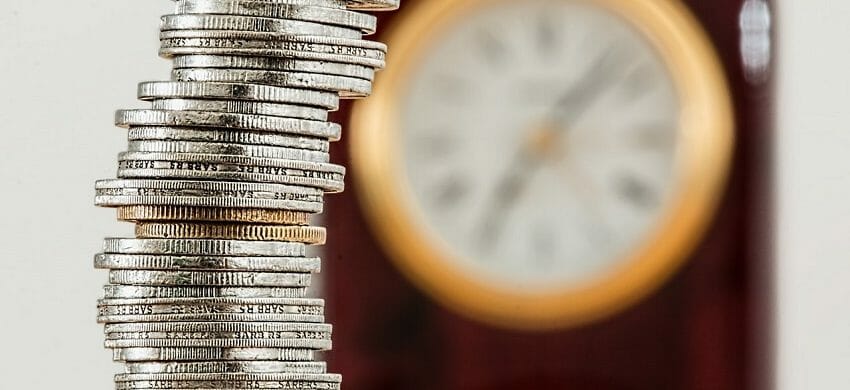Last Updated: March 25, 2024
Change Habits to Build Savings Quickly

Disclaimer: We are not qualified legal or tax professionals and are not giving advice. Always speak with a qualified professional before making any legal or financial decisions.
In today's fast-paced world, finding effective ways to save money quickly is more crucial than ever. From canceling unused subscriptions to automating your savings, small adjustments can lead to significant financial improvements in no time.
Whether it's building an emergency fund or saving for a vacation, discovering the right strategies can help you achieve your financial goals faster than you think.
Let's explore how to quickly enhance your savings with actionable tips that make a difference.
Don't want to read through? Speak to a debt specialist right now.
Start Using a Budget
One of the best ways to save money is from a budget. Track your expenses and create a budget for yourself. You need to know where your money is going and where you can stop or decrease spending it. You’ll find more details on budgeting here: How to get out of debt in 2020.
While you are budgeting, cancel any subscriptions that are unused or that you can do without. These can include gym memberships, magazines, and streaming services.
Set Up a Savings Account
Savings accounts may not be known for great interest rates, but there are online savings accounts with sign-up bonuses and better interest rates available. The other benefit of an online savings account is that it can take a bit longer to access your money so you can’t spend it without some effort.
Credit Cards
Stop using your credit cards and pay them down if you can. Try to make sure that your credit cards have rewards programs like cash back. But don’t use the credit cards just to build up your cash rewards. You probably shouldn’t use your credit card for everything. Learn more about what items you should pay for with a credit card here.
If you have a good relationship with your credit card company, you can ask them for a lower interest rate or you can always try to transfer your balances to a balance transfer card. Just read the fine print to make sure you are getting a good deal and understand what terms they offer.
Go through your online accounts and remove your credit card, PayPal, or debit card numbers. This will help you cut down on impulse purchases.
If you’d like to speak to a specialist about your debt, they can help explain all your options for free.
Downsize Your Home
Look for a smaller,
more affordable place to live if you have that option. If you can’t move, try to renegotiate your mortgage or rent. If you have an extra room available that you’re not using, consider renting it out short-term on Airbnb, or find a long-term roommate.
One option is to rent a storage locker if you have too many belongings. Unload what you can into a storage shed. Sell it, consign it, donate it, recycle it, or throw it away.
Groceries & Food
Make a shopping list, buy items you use in bulk and on sale if possible, and use coupons when you can. Most grocery stores have a coupon or savings program they offer. Ask your local grocery clerk where you usually shop, you may have to download their mobile app to participate. Next plan menus ahead of time and use the grocery store sales as a guide. Make more and freeze it for brown bag lunches or those nights when you just don’t want to cook.
In most cases, a deep freezer is a great addition to any home. Stock it based on sales and then use it. A crock pot is another great investment, especially if you don’t have a lot of time for food prep. A bit of effort in the morning will result in a hot, tasty, economical meal that evening.
Misc Money Saving Tips
- Use credit card rewards programs wisely to maximize your spending.
- Shop after the holidays and take advantage of any seasonal sales.
- Check bills for services you don’t use and try to drop them. Ask for fees to be waived when you sign up for new services.
- Look into automatic payment plans. Occasionally you will get a rate reduction and you won’t get hit with late payment fees.
These tips can help you save money. Some take a little time, but the effort can be well worth it in the end. If saving money is just more than you can manage and you can barely make your minimum payments on your debt, Pacific Debt, Inc. may be able to help you.
Before Deciding on Debt Settlement
Debt settlement is a big decision and a long-term commitment. Before choosing this option, be sure you have explored all alternatives and debt settlement is the right choice for your situation.
Review Your Budget Thoroughly
Analyze where all of your money is currently going by tracking your spending over the past 3 months. Look for areas where you can cut back on non-essentials. Getting your spending under control can sometimes resolve debt issues without programs.
Try Negotiating with Creditors
You can attempt to negotiate reduced interest rates or settle for less than the full balance. Be prepared with information about your current financial situation. Some creditors may be willing to work with you. However, results can vary greatly.
Consider Other Debt Relief Programs
Other options like debt management plans and credit counseling provide education and consolidate debts to potentially lower interest rates. Read our comparison of Debt Consolidation vs Debt Settlement. While these programs have no upfront fees, they take longer to complete than debt settlement and may not reduce debt as much.
Calculate Potential Settlement Amounts
Use a debt settlement calculator to estimate what settlement offers might be based on your debts' age and type. This can help set reasonable expectations before committing to a program.
New Debt Relief Options
With interest rates rising, new types of debt consolidation loans and other programs have become available that weren't viable for many people in the past.
Low-Interest Debt Consolidation Loans
If you have decent credit (scores over 660 or so), you may qualify for personal loans or balance transfer credit cards with lower interest rates. This can save substantially on costly credit card interest. Learn more about debt consolidation loans.
The Pros:
- Lower APR to save money
- Fixed regular payments
- Improve credit with on-time payments
The Cons:
- Application rejections more likely than debt settlement
- Loan denial hurts credit score
Employer Loan Repayment Programs
A growing number of employers now offer benefits to help pay back student loans and other debt. Check if yours has implemented such a program. Go in with realistic expectations, as help may be limited. Still, every bit counts.
FAQs
Conclusion
Debt settlement can be a viable option for becoming debt-free, but only after exhausting other alternatives and understanding the process fully. Work diligently on budgeting and speak to creditors before assuming programs like debt management or counseling won't provide adequate savings.
Debt settlement works best for those with very high unsecured debts compared to income that cannot realistically pay off balances through normal means. Partnering with a reputable, transparent debt relief firm provides the best chance at making settlements happen seamlessly while protecting your rights as a consumer.
If you have over $10K in credit card or similar debt with little hope of paying it back yourself, debt settlement may be able to eliminate that burden, but you must commit to the process to achieve success.
About Pacific Debt
Pacific Debt Inc. is one of the leading debt settlement companies in the US. We help you understand your options and whether or not debt settlement is your best option. If it is not, we will refer you to a trusted partner who may be more appropriate for your unique financial situation.
If you’d like more information on debt settlement or have more than $10,000 in credit card debt that you can’t pay, contact Pacific Debt, Inc. for a free consultation. We may be able to help you become debt-free in 2 to 4 years and we’ve settled over $300 million in debt for our customers since 2002.
Once you’ve completed our debt settlement program, your financial situation should start to improve. You’ll then be able to take the money you once had to pay towards your debt and be able to use it for other purposes like saving, investing, retirement, etc. We rate very highly in Top Consumer Reviews, Top Ten Reviews, Consumers Advocate, Consumer Affairs, Trust Pilot, and US News and World Report.
Pacific Debt is currently providing debt relief coverage in the following states:
Alabama, Alaska, Arizona, Arkansas, California, Colorado, District of Columbia, Florida, Idaho, Indiana, Kentucky, Louisiana, Massachusetts, Maryland, Michigan, Minnesota, Missouri, Mississippi, Montana, North Carolina, Nebraska, New Mexico, New York, Oklahoma, Pennsylvania, South Dakota, Texas, Utah, Virginia, Wisconsin
* Other states can be connected to one of our trusted partners
For more information, contact one of our debt specialists today. The initial consultation is free, and our debt experts will explain to you all your options.
*Disclaimer: Pacific Debt Relief explicitly states that it is not a credit repair organization, and its program does not aim to improve individuals' credit scores. The information provided here is intended solely for educational purposes, aiding consumers in making informed decisions regarding credit and debt matters. The content does not constitute legal or financial advice. Pacific Debt Relief strongly advises individuals to seek the counsel of qualified professionals before undertaking any legal or financial actions.
Reduce Your Credit Card Debt By Up to Half

BBB Reviews | 4.9/5.0 Rating









 Do Not Sell My Personal Information
Do Not Sell My Personal Information